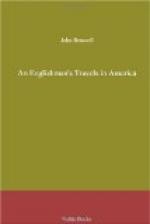that one of the laws passed directly after the insurrection,
was to prohibit negroes, on any pretence, to be out
after nine, p.m. At that hour, the city guard,
armed with muskets and bayonets, patrolled the streets,
and apprehended every negro, male or female, they
found abroad. It was a stirring scene, when the
drums beat at the guard-house in the public square
I have before described, preparatory to the rounds
of the soldiers, to witness the negroes scouring the
streets in all directions, to get to their places
of abode, many of them in great trepidation, uttering
ejaculations of terror as they ran. This was
an inexorable law, and punishment or fine was sure
to follow its dereliction, no excuse being available,
and as the owners seldom submitted to pay the fine,
the slaves were compelled to take the consequences,
which, in the language that consigned them to the
cruel infliction, “consisted of from ten to twenty
lashes, well laid on with a raw-hide,” a murderous
whip, which draws blood after the first few strokes,
and is as torturing, I should imagine, as the Russian
knout, certainly proving in many instances as fatal
as that odious instrument. The crowning severity
of the enactments I have referred to, remains, however,
to be told. So heinous in a negro, is the crime
of lifting his hand in opposition to a white man in
South Carolina, that the law adjudges that the offending
member shall be forfeited. This is, or was, quite
as inexorable as the one I have before spoken of, and
when in Charleston, I frequently, amongst the flocks
of negroes passing and repassing, saw individuals
with one hand only. Like the administration of
miscalled justice on negroes in all slave-holding states
in America, the process was summary; the offender
was arrested, brought before the bench of sitting
magistrates, and on the
ex parte[A] statement
of his accuser, condemned to mutilation, being at
once marched out to the rear of the building and the
hand lopped off on a block fixed there for the purpose.
I noticed a block and axe myself in the yard of a building
near the town-hall, and on looking at them closely,
saw they were stained almost black, with what I have
little hesitation in saying was human blood.
My conductor, however, tried to divert my attention
from the object, and knowing I was an Englishman,
refused to enter on the subject.
[FOOTNOTE A: The writer was assured, when in
Charleston, that this was the case in five out of
every six cases.]
Another of the many cruel laws put in force after
the emeute of the negroes, was to prohibit
any coloured person from walking on the pavements,
and forcing all males to salute every white they met.
These distinctions, although falling into disuse,
are not even yet abolished, but still, with many others
equally odious, disgrace the Carolinean statute book.
I saw several negroes from the plantation districts,
walking in the road instead of on the pavement, in
accordance with this law, touching their hats to every
white passer-by; they were consequently obliged to
be continually lifting their hands to their heads,
for they passed white people at every step. Although
I believe no punishment is now enforced for the omission
of this humiliating homage to colour, the men I have
referred to were doubtless afraid to disregard the
ceremony.




